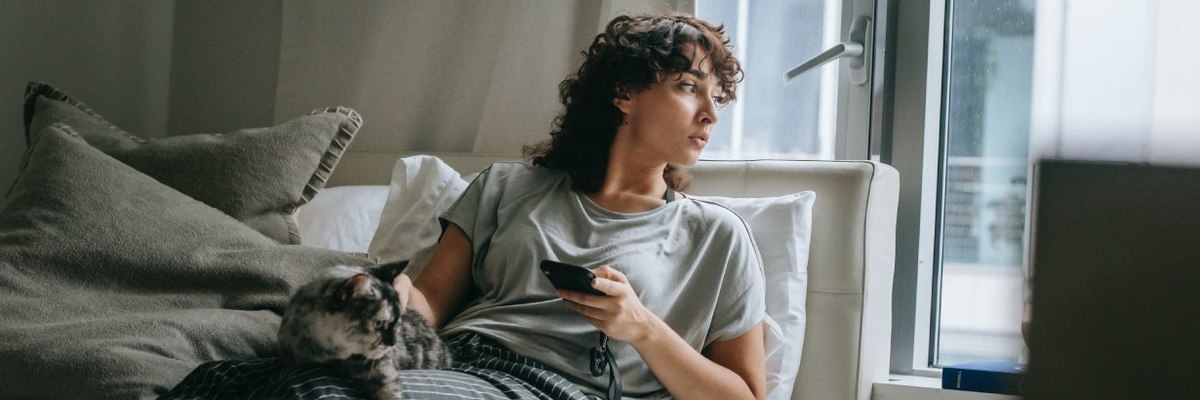This chapter of the Sleep Study looked at the effects light from screens and noise have on sleep. Scientific research focussing on how the use of tech devices close to bedtime impacts the quality of sleep suggests that people should avoid screen use in the hour before bed. Yet the results show huge numbers of Britons are staring at their gadgets during this time.
How often do Britons look at their devices within an hour of going to bed?
The YouGov Sleep Study asked Britons how often they look at a screen before going to sleep. Nearly nine out of ten (87%) say they look at their phone/tablet within an hour before going to bed. While 10% do this rarely and 16% occasionally, six in ten (61%) say they usually look at their phone/tablet screen before bedtime.
Britons aged 25-39 (78%) are the most likely to say they usually look at their phones/tablets before going to bed. Results also show that eight in ten British women aged 25-39 (81%) say they usually look at their phone/tablet an hour before bedtime, which is notably higher than in other groups.
Just 12% of Britons say they don’t look at a mobile or tablet screen an hour before turning in, with this being more the case for men (14%) than women (10%). Britons aged 60+ are significantly more likely than younger generations not to look at their device before sleep: 26% vs 3-9% in other age groups.
Asked more directly when exactly the last time is they look at their phones before sleep, a quarter of Britons (25%) say they last look at their phone immediately before turning in, one in five (19%) do so 10 minutes before bedtime and 23% say they last look at their device half an hour before bed.
Television
Eight in ten (82%) Britons sometimes watch television within an hour of going to bed, including half of Britons (50%) who usually do so, and a third (32%) who do so occasionally or rarely. Just under one in five (17%) never watch TV in the hour before bed.
Britons older than 40 (56-59%) are more likely than those aged 25-39 (45%) and much more likely than those aged 16-24 (24%) to report usually watching TV in the hour before bedtime.
Computers
Computers are the least likely personal device to be used by Britons an hour before going to bed, our research shows. Four in ten (43%) say they never do this, which is significantly higher than in the case of phones/tablets or TV.
Men (37%) are more likely than women (27%) to usually or occasionally look at a computer screen close to their bedtime.
Do you usually take your phone to your bedroom when you go to sleep?
Just one in five Britons (21%) say they do not keep their phone in their bedroom at night. While this applies to just 9% of 16-24-year-olds and 3% of 25-39-year-olds, this rises to 20% among those in their 40s and 50s and 40% among those 60 or above.
Three-quarters of Britons (74%) say they do keep their phone in their bedroom at night.
A quarter of Britons (26%) say they usually check their phone when they wake up in the night. Younger people (38-41%) are more likely than those 40 and above (10-24%) to be checking their phone at night.
The impact of light on sleep
Eight percent of Britons say they sleep with a light on in their room. Britons aged 16-24 (16%) are the most likely to keep a light on.
Britons are split on whether a screen or a light coming from the outside makes it hard for them to fall asleep: 48% say it does, and 45% say it does not. Half of women (52%) have difficulty falling asleep if there is a light coming from somewhere, compared to 44% of men.
Britons in their 60s or older (40%) are less likely than younger generations (49-54%) to say that light bothers their sleep.
How often do Britons listen to music, podcasts, or the radio when going to sleep?
The YouGov Sleep Study finds that 46% of Britons listen to music or podcasts or radio as they go to sleep. One in three (28%) do it often or sometimes, while one in five (18%) do so more rarely.
Britons aged 16-39 (32%) are notably more likely than those aged 60 and above (22%) to say they often or sometimes listen to something when going to sleep.
Can Britons sleep with noise?
Two-thirds of Britons (68%) find it hard sleeping if there is a noise in the background. While 57% can tolerate some levels of noise, one in nine Britons (11%) can sleep with almost any noise in the background. On the opposite end are 28% who say they need complete silence to sleep, with this applying more to women (33%) than men (23%).
Among Britons who say they find it difficult to fall asleep, a third (36%) can’t tolerate any background noise.
See full results here









